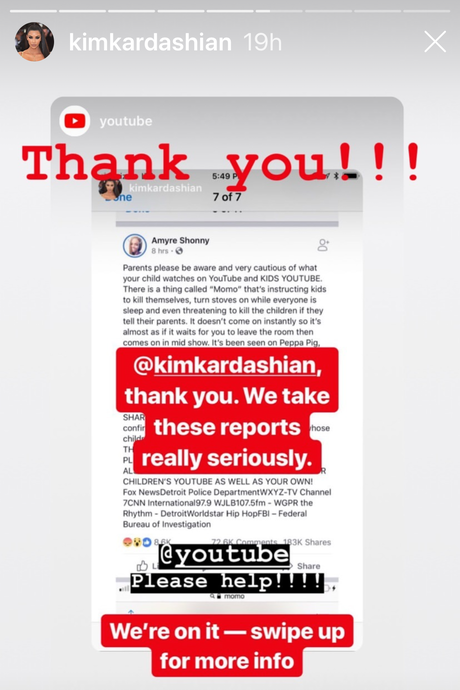
Momo is not real. Kids being scared after seeing a picture of a freaky statue designed by a special effects company, that’s real. Parents being alarmed after noticing a clip with instructions on how to slit one’s wrists spliced into an otherwise innocuous YouTube video for kids. Also real. Child predation going down in YouTube comments. Real, too. But Momo, the viral meme dating to 2016 and circulating on the internet again this month, allegedly appearing in YouTube videos telling kids to kill themselves, is not real.
The thing is, unless you did your homework, you might have a hard time figuring that out. Meaning you really did your homework, and did it armed with a decent working knowledge of weird internet phenomena, along with a meme dictionary. Headlines across the globe have been declaring Momo a timely danger all week. “Viral ‘Momo Challenge’ Encouraging Child Suicide Terrifies Utah Kids.” “Dangerous, Viral ‘Momo Challenge’ Causing Concern for Parents.” “What Is the Momo Challenge? Sick WhatsApp ‘Suicide’ Game Targeting Young Kids.” (Nieman Labs has a good roundup of local news stories peddling Momo bs.)
Kim Kardashian West screenshotted a copy-and-paste Facebook status warning about Momo, which she kindly shared with her 129 million Instagram followers without bothering to do any research. (The Facebook status she screenshotted calls out organizations including the FBI and World Star Hip Hop, but does not link to their respective pages. It’s a telltale sign of copy pasta, or a status that has been copied and shared ad nauseam.) “YouTube, help!” Kardashian West wrote, tagging the platform.
It’s not just worried parents and lazy media outlets spreading Momo hysteria. Police in Northern Ireland warned about the “game” in a Facebook post. “When downloaded [Momo] tells your child to communicate with them via WhatsApp and a number of other widely used apps,” they wrote. A sheriff’s office in Florida called it an “application,” describing it in a nonsensical tweet claiming Momo appears in video games, YouTube videos, and chat apps. Nobody who claims to have seen Momo can provide a link to a specific video or photos to prove they “saw” “Momo.” A colleague of mine forwarded me an email sent from her kid’s public school district in New Jersey, which to be fair included a fair amount of hedging about Momo, but still told parents and guardians “news outlets report that a frightening avatar asks its viewers to perform violent and dangerous tasks” and included links to several breathless pieces of coverage.
Earlier this week, YouTube published a statement denying any “recent evidence of videos promoting the Momo Challenge on YouTube.” Then on Instagram, YouTube screenshotted Kim Kardashian West’s screenshot about the Momo threat and said they were on it. The company included a link to the statement, but the text in its Instagram story just thanked Kardashian West, saying “we take these reports really seriously.” YouTube didn’t highlight any other information for its 18 million Instagram followers — not a “this was never a real threat” or “after further investigation, we’ve determined this is a hoax.” Kardashian West later shared the company’s reply. To anybody who didn’t bother to swipe to YouTube’s press release, it looked like a celebrity saved their children from a scary (and nonexistent) YouTube monster.
A mom slid into my Instagram DMs berating my story debunking Momo and insisting she had sources inside at Google and YouTube who told her “off the record” that the company actually knows Momo videos exist, and how they are getting in front of children, and is “basically going to try to fix this while everyone forgets about it.” (She warned me about a setting that allows YouTube Kids — the app just for children’s content — to pull similar videos from the wider world of non-vetted YouTube. Here’s a helpful guide from Wired on ways to keep your kids safer using the app that explains the setting fully.)
I’m all for healthy, even passionate skepticism when it comes to tech companies and what they’re telling us. This is good online literacy, the kind we can only hope Generation Momo absorbs to use as adults in the real world. A different colleague told me she witnessed a fellow member of a parenting Facebook group come under attack after asking for more information from a person who claimed a friend’s child had seen Momo on YouTube. The question-asker was eventually forced to recant and apologize for questioning the poster’s credibility. It’s this, the teetering into conspiracy-theory peddling without real proof, that is actually dangerous. It helps viral “challenge” after challenge — Tide Pod eating, condom snorting — gain legitimacy. And it enables hoaxes like Momo to live a much longer life online than they should.






























